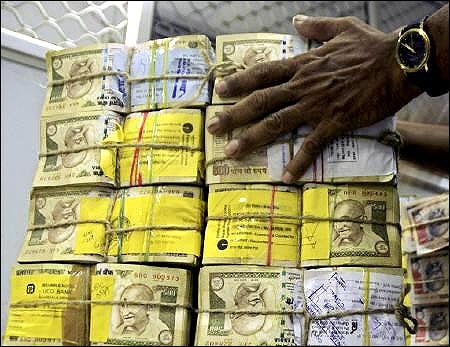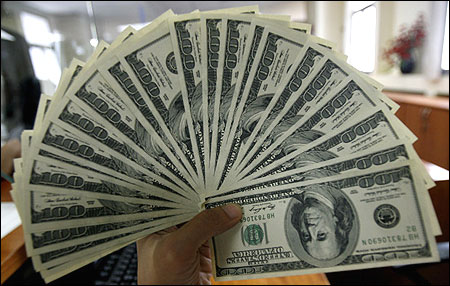 | « Back to article | Print this article |
Rupee woes: Caught on the wrong foot, firms take short-term bets
The sharp fall in the rupee has caught many on the wrong foot; with the 21 per cent depreciation this year making most hedging strategies redundant.
Most exporters had hoped the rupee would stay stable and had sold dollar receivables at Rs 47.
But the rupee moved the other way and depreciated to Rs 53 to the dollar.
Exporters who had sold forward are not only repenting the opportunity lost, but have to provide for mark-to-market (MTM, writing down assets to reflect current values) losses on these contracts at the end of the quarter, according to the accounting norms.
Many exporters had sold 70-80 per cent of their receivables forward till December and March 2012.
Many had sold forward in May-June since the equity market was strong and the rupee was expected to remain firm.
Having burnt their fingers, exporters are going slow on selling incremental orders, as the rupee keeps depreciating.
Click on NEXT for more...
Rupee woes: Caught on the wrong foot, firms take short-term bets
They are hoping a rate cut by the Reserve Bank of India (RBI) tomorrow could boost equities.
With increasing costs (the six-month forward premia is ruling at 5.54 per cent per annum), exporters are not keen to cover for six months at such a high rate.
Higher MTM loss
Importers, many of whom had kept their positions open, are rushing for cover as their costs are increasing with the depreciating rupee.
"Companies with payables falling due in the near term are more vulnerable and are trying to cover their positions on all dips (whenever there's a small correction)," said Subramanian Sharma, director, Greenback Forex, a Mumbai-based forex consultancy. "Importers are more active than exporters as their liabilities are increasing with every passing day."
Click on NEXT for more...
Rupee woes: Caught on the wrong foot, firms take short-term bets
The worst affected are companies that have taken foreign currency loans.
With the rupee depreciating 10 per cent since September-end, the provision for MTM losses will increase dramatically in the quarter ended December and erode profits.
Many companies used lower interest rates and easy liquidity in the West in the last few years, to bring down their cost of borrowings. Barring public sector units (PSUs), companies tend to keep their forex risk open to ensure a lower cost of funds. This has backfired.
"Companies don't follow any strict hedging policy. For many, it's more of reacting to market movements than having a well-defined risk-management policy. Promoter-driven companies tend to be more adventurous," said Pushkar Bagga, senior vice-president with forex consultant Mecklai Financial.
For instance, two years before, many had sold their dollar receivables forward for three to five years at a time when it was considered the rupee would appreciate. But it went from Rs 40 to Rs 52.
Click on NEXT for more...
Rupee woes: Caught on the wrong foot, firms take short-term bets
A key learning from this episode has been that companies don't want to go long term and avoid forex derivatives.
"A good thing is that most companies are hedged for within the year. So, the losses would be lower than otherwise (had the bets been more long term)," said Bagga. Information technology companies have been quick to learn and taken short-term bets.
IT firms show the way
Looking at the depreciating trend of the Indian rupee against the dollar, most Indian IT firms have revised their hedging strategy by taking a short-term view.
Tata Consultancy Services, India's largest IT exporter, earlier said the company would shift to a short-term strategy to protect margins instead of taking multi-year cover. Infosys has also taken a short-term strategy and the hedges cover it only for the next two quarters.
"We are covering up to the next two quarters of exposures at any point of time. We are not going beyond that," said V Balakrishnan, chief financial officer (CFO) of Infosys, India's second largest IT services company.
Click on NEXT for more...
Rupee woes: Caught on the wrong foot, firms take short-term bets
Infosys has hedged $450-500 million, or 30 per cent of its net receivables for two quarters, at different rates.
MindTree, a mid-size IT services firm, said its policy is to hedge only 50 per cent of its business on a rolling 12-months basis.
"So, to that extent, the impact is relatively neutral for us," said Rostow Ravanan, co-founder and CFO of MindTree. As on September 30, it had hedged $140 million at an average rate of Rs 46.
Though a falling rupee is beneficial for them in the short term, IT companies feel it may not benefit them in the long-run because the hedges they have taken could become negative.
"In the short term, it will be beneficial for the export-oriented business, including the IT industry. But the hedges we have taken in the past could become negative and the cross-currency movements could cause a concern. Because the (US) dollar is appreciating against all currencies now," said Infosys' Balakrishnan.
Click on NEXT for more...
Rupee woes: Caught on the wrong foot, firms take short-term bets
IT companies are concerned about India's weak economic fundamentals.
"If you take the fundamentals of the country, the economic growth is coming down and inflation is still very high and also the Index of Industrial Production (IIP) numbers are bad.
There are lesser equity inflow and reluctance of the regulator to intervene in the market. In this kind of situation, the chances of rupee depreciating further is very high," said Balakrishnan.
"In the medium to long term, this will be a cause for concern because the depreciating rupee is in a way indicating the poor economic fundamentals," said MindTree's Ravanan.






